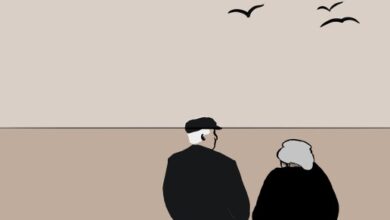Charles Mungoshi’s “The Setting Sun and the Rolling World” is a short story that traces a conversation between an old farmer, Musoni, and his son, Nhamo, over the latter leaving his home to pursue a life and career outside farming, which has been his family’s traditional occupation. The story employs the third-person omniscient narrator to highlight the multifarious aspects of a father-son relationship and the dynamics that underpin a changing world.
Charles Mungoshi is a Zimbabwean writer and poet who has authored several novels, poems, and short stories in his native language, Shona, and English. “The Setting Sun and the Rolling World” is a short story that was published as a part of his larger collection of the same name, in 1987.
The Setting Sun and the Rolling World | Summary
The story opens with Old Musoni being disturbed from his farm work by the sound of an approaching airplane that is flying overhead. Gazing at the setting sun, he looks down on the hard, ‘sun-blasted’ land and wishes for rain, indicating that bad rainfall has led to a bad harvest this season. His son, Nhamo approaches, greeting his father, who finally voices the question that has been on his mind all day – whether he has changed his mind or not. The context of this question is not yet revealed to the reader, but Nhamo replies that he hasn’t. He assures his father that his decision is well thought out, and insists on there being no other way. Musoni senses the anger rising in his chest but restrains himself. It is now revealed that his son has decided to leave home, and Musoni does not want to spend his last day with his son in anger. He fears for Nhamo being out in the world, alone and homeless, with beasts more savage than lions waiting to pounce upon his boy. His thoughts strayed to the airplane, which he calls ‘the white metal bird’, indicating that the savage beasts he fears may be humans.
Musoni urges his son to reconsider his decision, insisting that the only escape from the world is through one’s family and land. Nhamo is adamant, however, and reminds his father that the land is now dry and infertile, impoverishing them and creating rifts within the family. This argument leads to a series of internal monologues by both father and son, which differ significantly from what they say out loud to one another. An angry Musoni thinks that although unprecedented misfortunes are being heaped on the land, that and the family is still the only way of life that can offer even a hint of stability and certainty. He considers his son ‘a mere beardless kid’ with remnants of milk on his knows, who is completely inexperienced in the ways of the world, and too proud and overconfident to admit it. But all he says aloud is to ask Nhamo if there has been anything that he, as his father, has ever denied him.
Nhamo answers with, “All. You have given me all, father.” But in his mind, he is angry and patronized, furious at his father for having given him “all and nothing”, having educated him only to now ask him to waste his education in the fruitless pursuit of agriculture in a barren land. He thinks of his father’s life as “a dance of death”, and that he is jealous of his son trying to make his way in the world. He is wiser and better equipped than his father’s expectations, but all he says is to assure his father of his safety and well-being and request him to release him from his obligations and pray for him.
With a moment’s spark in his eyes, Musoni asks Nhamo if he knows what he is doing, and what he’ll be the moment he leaves home –
“A homeless, nameless vagabond living on dust and rat’s droppings, living on thank-yous, sleeping up a tree or down a ditch, in the rain, in the sun, in the cold, with nobody to see you, nobody to talk to, nobody at all to tell your dreams to.”
He asks him if he knows how it feels to see his dreams and ambitions come crashing back down to reality. In his mind, he asks his son if he knows the ruins of old age and ‘black despair’. His son confidently answers that he knows enough to start, and will learn the rest on his way, maybe enough to return to his home once more. His old father looks at him and thinks that he is never returning to this ‘ruin’ he now calls home but will continue to walk past ruins until the only ruin that is left is himself. But he is tired and aware of the futility of all his attempts to convince his son to stay back, having driven around that same circular conversation for two months. He blesses his son, reminding him that he will return one day, and will find a home waiting for him as long as his father is alive. He also asks him to visit the ‘chiremba’, i.e., Shona for a traditional Bantu Doctor, to ensure his strength and vitality before embarking on his long, difficult journey.
Nhamo thanks him, feeling great love for his father. However, he has no faith in his old father’s beliefs and customs and resolves to discard the charms of the Chiremba after visiting him. Charms were for old men like his father, while a man like him had their own feet and guts for support. He wouldn’t even need God until much later in life. The youth is godless, and no charms or superstitions work for them. He feels light-hearted, knowing that only the physical ties tie him to his family, the psychological ones being broken. He is unburdened and weightless, and thinks of himself as the sun,
“burning itself out every second and shedding tons of energy which it held in its power, giving it the thrust to drag its brood wherever it wanted to.”
This truth was what his ancestors had failed to understand, leading to their ruin. He leaves, humming Louis Armstrong’s “What a Wonderful World’’.
Musoni does not look up to see his son leave. He promises himself to protect his family from any fate too painful as long as he lives, especially his youngest son, Nhamo. He resolves to see the Chiremba the next day and seek blessings for his son.
The story closes with a blood-red, haunting image of the setting sun.
The Setting Sun and the Rolling World | Analysis
“The Setting Sun and the Rolling World” is, at its core, a story about an inter-generational conflict of ideas and interests. As an old father, Musoni represents the old, traditional order of the patriarch as a protector and benefactor who upholds traditional ways of life and protects his family from harm. Knowing nothing outside the farmer’s way of life, his son’s choice of deserting home and family occupation spell out instability and danger in his mind. Despite knowing that the almost-dead land does not hold a bright future for Nhamo, he would still prefer having him under his roof leading a life that he and his ancestors are familiar with, rather than have him venture out in unknown directions to make his way in the world. However, as a responsible and sensible father, he knows better than to force his son to comply with his wishes and respects Nhamo’s sense of agency and right to choose how he wants to live his life.
As a representative of the younger generation, Nhamo stands for youth, energy, and vitality, as well as the heedless courage and bravado that comes from inexperience. He is rebellious, but not enough to openly disrespect his father, although he has decided to go against his father’s wishes, and thinks of him as foolish, selfish, and jealous of his son’s ambition. Although he is naïve and inexperienced, he recognizes the importance of trying to break the chain of poverty and generational practices (in this case, farming) to make progress as an individual, in turn, begetting progress in the community. His departure from the scene, humming “What a Wonderful World” also depicts his naivete, looking at the world with the rose-tinted glasses that characterize youth.
The story is set in rural, pre-industrialized Zimbabwe, and Musoni thinking of the airplane as a ‘white metal bird’ signifies the lack of modern education and exposure that he has received. However, by sending Nhamo to school, he shows that he realizes the importance of education in giving one a greater quality of life. This view, however, leads to Nhamo’s independent character development, which ultimately results in his decision to leave the house to pursue his dreams. Here, Nhamo’s modern education clashes with his father’s traditional worldview, although the contribution of education is not made explicit in the story.
The story also depicts the gaps in human communication, and our inability to voice all the things that we may think. The vast differences between the character’s internal monologues, and what they say to each other, reveal the gaps between interiority and exteriority.
The Setting Sun and the Rolling World | Themes
Intergenerational Conflict – The story depicts the conflict between two generations of men – the father, with his traditional life as a family man and a farmer, and his son, a young, ambitious boy resolved to make his way in the world.
Gaps of Communication– The ubiquity of internal monologues in the story, and the differences between what the characters think and say, represent the limitations of human communication as well as the difference between a person’s interiority and exteriority.
Significance of the Title
The title, “The Setting Sun and the Rolling World” symbolizes the circularity and repetition of intergenerational conflict in society which is necessary for progress and change, by associating it with the circular pattern of day and night, and the rotation of the world.


